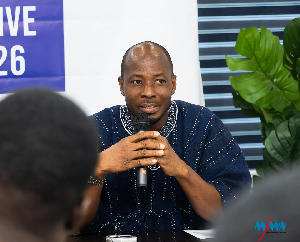Eximguaranty Ghana Limited and the USAID Financing Ghanaian Agriculture Project (USAID-FinGAP) are collaborating to provide credit guarantees which are expected to increase financing for agricultural development and innovation in Ghana.
The collaboration, according to Felix Ntrakwah-Board Chairman of Eximguaranty, was born out of the fact that agribusinesses seeking financing to meet their business needs lack the fixed asset collateral usually demanded by financial institutions.
“Exim is therefore collaborating with FinGAP to support Small and Medium including Large Enterprises with viable business ventures in the maize, rice and soy value chain, through the provision of credit guarantee in favour of financial institutions offering credit,” he said.
To ease the full burden of guarantee fees on the borrower, FinGAP will pay 50 percent of the guarantee fee upon approval and acceptance of terms and conditions by the financial institution.
FinGAP has received a grant of US$100,000 from USAID in favour of Exim, earmarked to support paying 50 percent of the guarantee fees that would have been borne by the applicant.
“Thus, the main objectives are to augment the security requirement of the financial institutions, share the risk of default with the financial institutions, reduce the cost of borrowing; cause credit or financial additionality, technology and knowledge spill-over, and economic additionality (increase in profit and employment),” he said.
Mr. Ntrakwah noted that Exim is collaborating with a number of institutions to facilitate the flow of credit in the form of loans from financial institutions, equipment from merchandises, and inputs from dealers.
He added that Exim is adding a new product whereby it will conduct initial appraisals of businesses, and if found viable the businesses will be issued with a Letter of Intent to seek funding from financial institutions.
At a breakfast meeting that came off in Accra, Mr. Ntrakwah noted that agriculture is the economy’s backbone and has the greatest potential for not only creating wealth but also reducing the increasing level of unemployment among the youth.
The breakfast meeting was attended by bankers, insurers and other stakeholders in the agribusiness lending sector, like the Ghana Agriculture Insurance Pool (GAIP).
First Deputy-Governor of the central bank Millison Narh noted that all over the world, agriculture risks are among the major bottlenecks of production and food security; and if not mitigated, these risks can have far-reaching consequences on the individual farmer, the consumer industry, and country as a whole.
“Uncertainty and risks in agriculture affect production decision, on-farm risk management strategies, long-term investments and access to financial services,” he said.
Victor Antwi, Deputy Chief of Party and Manager of Agribusiness Opportunity Development Unit at USAID-FinGAP, noted that agribusiness financing is very important -- but most of the time banks run away from it because of the perceived risk.
“Agriculture risk is real, but with this collaboration those risks will be highly mitigated,” he said.
Dr. Antwi explained that USAID-FinGAP, a five-year project from July 2013 to July 2018, provides a comprehensive and integrated approach to financing actors and increasing competitiveness in the maize, rice, and soy value chains of northern Ghana.
Through incentives, training, and technical assistance, FinGAP builds the capacity of Financial Institutions (FIs) and Business Advisory Services (BAS) providers to facilitate private finance and investment to thousands of Micro, Small, Medium, including Large Enterprises (SMiLEs) in the target value chains.
“So far we have US$91million funding in the rice, maize and soya value chains alone. Most of the money went to the input dealers, the processors as well as the farmers.”
Of the total amount facilitated, Dr. Antwi added, 16.5 percent has gone to farmers directly and about 45percent went to input dealers - while the rest went processors, aggregators and equipment dealers.
Mr. Andani, added that banks have been building their internal capacity to understand the business of agriculture so they can help farmers better.
“The trouble, as we said, was the unproductivity in agriculture; and if we should have a much more organised predictable system, probably the potential could be bigger. And as the macro economy improves interest rate will come down, and farmers and other borrowers will be able to get funding at lower interest rates,” Mr. Andani added.
He noted that apart from direct financial support, several CSR-led initiative of banks are directed at giving financial literacy to the farmers, so that they can manage their farming in a much more commercial way to make them appealing to lenders.
Business News of Monday, 27 June 2016
Source: B&FT













